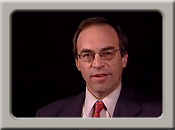UC Berkeley Web Feature
Rx for Social Security
Alan Auerbach: 'Should we let people fend for themselves?'
Alan Auerbach is a UC Berkeley professor of economics who served in the early 1990s as deputy chief of staff for the U.S. Joint Committee on Taxation, which advised Congress on tax policy. Media Relations recently talked with Auerbach about Social Security.
Q: How do you assess the health of the Social Security system? Is it going broke, or not?
A: It needs to be attended to. People who argue that it's not as bad as some people say are right, in some sense, because it is a manageable problem. It's not something where the sky is falling and we can't do anything about it. We certainly could make no significant changes in the Social Security system and fix it – that is, increase the retirement age a little bit, increase the income subject to the payroll tax a little bit, do a variety of other little things. That's pretty much the approach they took in 1983.
What a lot of the debate is about now is whether this crisis – however big it is – should also be used as an opportunity to make major changes in the Social Security system, particularly privatization or partial privatization.
Q: What about privatization?
A: The argument on one side is, "Look, a lot of these people are people who don't have enough money, they don't have private savings of their own, and they're basically living paycheck to paycheck. They put aside a little money, maybe in a bank account, for immediate needs, but they don't have opportunities to invest." So, the government is saying, "We're going to lend you money. It may seem like a high interest rate, but it's a lot lower than you get on your credit card or even a home mortgage. We'll lend you this money, and you can go invest it in the stock market through a controlled environment. Then you're not going off on your own, we're going to give you some narrow options, all of which are pretty well diversified." The argument in favor of it is it's giving people the opportunity to attain ownership of stock in a way that many people currently don't.
The downside is that a lot of people don't really understand it. They're not experienced, they don't know what they're doing, and even if their choices are circumscribed, as they would be, after the fact they may end up being very happy or very sad that they made that investment choice.
 'If their investments do poorly, if for one reason or another they don't make the right choices, when they're 65 or 70 and sitting on the street will we come and bail them out?' -Alan Auerbach |
Many people – even people who think stock market investment is a good thing – fear a political problem, which is that people more or less will demand the best observed outcome: "I see somebody else doing better, and I want that, too." Under current Social Security, everybody gets the same benefit, our incomes are different because [Social Security] is based on our income, but the formula is the same for everybody.
Q. What about choice, luck and bad luck?
A. This is where you get into an uncomfortable argument about paternalism. People who are in favor of this say, "You're not trusting people to be intelligent enough to make their own decisions."
On the one hand, I certainly don't think centralizing everything within the government is a good idea. But I do worry about the transition. I think there are certainly going to be, over a period of transition as we adopt such a system, a lot of horror stories.
Privatization should not be viewed primarily as a solution to the Social Security problem, in terms of the budget. It's really a way of saying, "We'll lend you money, and you can invest, and we're going to make you pay the loan back out of reduced Social Security benefits." But there's no cut there. I view it more of a way of saying to people, "Step 1, We just cut your benefits; Step 2, We'll loan you some money and let you invest in the private market and you might be able to do better than the 2 percent [earnings], and if you do, you can make back some of the money we took away from you in the form of the benefit cut."
Do we feel comfortable reducing government involvement in this and making people more self-reliant? Ultimately, there's a question of whether we let people fend for themselves. If their investments do poorly, if for one reason or another they don't make the right choices, when they're 65 or 70 and sitting on the street will we come and bail them out?
If we think we will [bail them out], then in some sense we have the right to say more about the choices people make. To say that, "Here's the money, go invest it as you like, and if you squander it, we'll bail you out," we're giving ourselves a bad deal. We ought to have the right to tell people, "Now you have to invest that in something safe, so we know you have enough money when you retire and we don't have to support you."
That's where it gets sticky. If you look at the U.S. over long periods of time, you can pick just about any 10- or 20-year period of time and the stock market looks good. So, it seems like good advice to tell people, "If you're investing for the long term, you should invest in stock. Stock is riskier, but over the long term, it's going to do better."
But bad things happen. ... Given that it's a government program, I worry about people thinking it's guaranteed, even though it's a private investment.
Q. Who wins and loses with privatization?
A. Wall Street stands to gain because they'll be managing the accounts – although they're very quiet about it because they don't view themselves as standing to gain by going public and saying privatization is really good because [they'll] get all this money.
The securities industry will have more money passing through its hands. That's not necessarily a bad thing. It depends on what the rates are that it charges. If it's run efficiently, there isn't necessarily anything wrong with that.
In terms of who loses, it's a little hard to say because we have an unsustainable fiscal policy right now, which means that it can't play out the way it's currently scheduled to play out. So when you say, "Who's losing?" it's a question of losing relative to what? We're all losing. We can't have what it [Social Security] says we're going to have.
Q. What do you recommend?
A. I probably would take a more conservative approach. I would adopt one of the plans to simply fix Social Security the way we fixed it in the '80s, which would probably involve some tax increases and benefit cuts. I think it's less disruptive. I think it has less downside risks in terms of things that can go wrong. I don't think the changes would be so large.
As far as privatization goes, I think encouraging people to save and particularly encouraging lower-income people who don't save to save is a good idea. But I don't see why those two things [adjusting Social Security and privatization] have to be combined.


